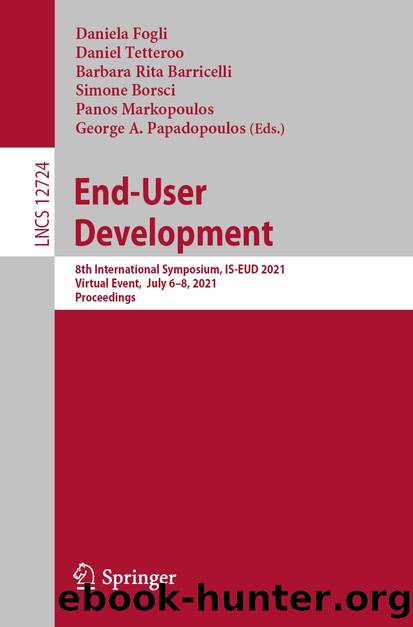End-User Development by Unknown

Author:Unknown
Language: eng
Format: epub
ISBN: 9783030798406
Publisher: Springer International Publishing
6 User Study
The goal of the test was to get feedback from real stakeholders on the potentialities of the platform and the approach. The test was remotely conducted. Potential participants were recruited from the network of the members of a Regional project, trying to involve non-technical personnel (i.e. heads of departments, managers). They were first contacted by phone/email to ask for their willingness to participate. Then, they received an email detailing the test structure (also including info on the processing of personal data and the request for informed consent), its objectives, and main functionalities of the Rule Editor and of the simulators (also with a short video). We sent them also the tasks, the links to the tools and the simulators to use for the test (with associated credentials), and to the online questionnaires to fill in anonymously after the test: the SUS Questionnaire, and further ad-hoc questions about the approach and the tool. The metrics considered were errors (how many and of which type), and task success categorised as it follows: complete success: the user has not made any mistake; failure: the user gave up or did not complete the task; minor problems: the user made one or two errors; major problems: the user made more than two errors. We considered an error a difference between the rule defined by the participant and its correct specification. Possible errors on trigger specification are: i) use of an event instead of a condition and vice versa; ii) use of a trigger element other than the one expected (i.e., use a trigger that involves the âdryerâ element instead of one involving the âpulperâ); iii) selection of an incorrect attribute within a trigger (i.e. instead of specifying âinsideâ an environment (i.e. a department) specify âoutsideâ it; iv) inclusion of an additional trigger, not required by the rule; v) a missing trigger. Except for the first type (which deals with the event/condition distinction, peculiar to triggers), similar types of errors were considered for actions.
Download
This site does not store any files on its server. We only index and link to content provided by other sites. Please contact the content providers to delete copyright contents if any and email us, we'll remove relevant links or contents immediately.
Kotlin in Action by Dmitry Jemerov(19348)
Grails in Action by Glen Smith Peter Ledbrook(16799)
Sass and Compass in Action by Wynn Netherland Nathan Weizenbaum Chris Eppstein Brandon Mathis(14283)
Configuring Windows Server Hybrid Advanced Services Exam Ref AZ-801 by Chris Gill(7520)
Azure Containers Explained by Wesley Haakman & Richard Hooper(7514)
Running Windows Containers on AWS by Marcio Morales(7066)
Microsoft 365 Identity and Services Exam Guide MS-100 by Aaron Guilmette(5450)
Microsoft Cybersecurity Architect Exam Ref SC-100 by Dwayne Natwick(5289)
Combating Crime on the Dark Web by Nearchos Nearchou(5043)
The Ruby Workshop by Akshat Paul Peter Philips Dániel Szabó and Cheyne Wallace(4720)
Management Strategies for the Cloud Revolution: How Cloud Computing Is Transforming Business and Why You Can't Afford to Be Left Behind by Charles Babcock(4563)
Python for Security and Networking - Third Edition by José Manuel Ortega(4295)
The Age of Surveillance Capitalism by Shoshana Zuboff(4274)
Learn Wireshark by Lisa Bock(4192)
Learn Windows PowerShell in a Month of Lunches by Don Jones(4191)
Ember.js in Action by Joachim Haagen Skeie(4071)
The Ultimate Docker Container Book by Schenker Gabriel N.;(3937)
DevSecOps in Practice with VMware Tanzu by Parth Pandit & Robert Hardt(3626)
Windows Ransomware Detection and Protection by Marius Sandbu(3599)
